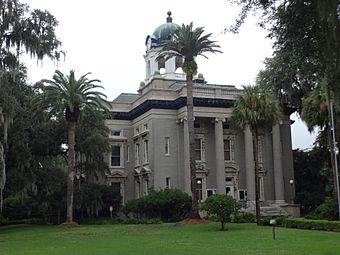Old Glynn County Courthouse facts for kids
Quick facts for kids |
|
|
Old Glynn County Courthouse
|
|
|
U.S. Historic district
Contributing property |
|

Old Glynn County Courthouse (2015)
|
|
| Location | 701 G Street Brunswick, Georgia |
|---|---|
| Built | 1907 |
| Architect | Charles Alling Gifford |
| Architectural style | Renaissance Revival |
| Part of | Brunswick Old Town Historic District |
| NRHP reference No. | 79000727 |
| Added to NRHP | April 26, 1979 |
The Old Glynn County Courthouse, also known as the Historic Brunswick Courthouse, is a very old and important building in Brunswick, Georgia. It was designed by a famous architect named Charles Alling Gifford. Workers built this courthouse between 1906 and 1907.
This building is a special part of the Brunswick Old Town Historic District. This district is a protected area because of its history.
Contents
History of the Courthouse
Early Buildings
Long ago, even before 1829, there was a courthouse in Brunswick, Georgia. We don't know exactly what happened to it, but it probably burned down. After that, court meetings were held in different rented places.
In 1884, a new wooden courthouse was finally built. Around this time, the Port of Brunswick was getting very busy. A few years later, in 1892, a new city hall was built. This city hall had special rooms for court cases. These rooms were used by both the city court and the county court for Glynn County.
There were plans in 1897 to build another new courthouse. However, the city could not get enough money for the project, so it didn't happen.
Building the New Courthouse
Work on the current Old Glynn County Courthouse started in 1906. Charles Alling Gifford, an architect from New York City, designed the building. He had also designed many parts of the Jekyll Island Club, which is also in Glynn County.
On June 20, 1906, city leaders approved the plans for the building. Construction finished in 1907. The courthouse stands in what is now the Brunswick Old Town Historic District. This area is recognized as a historic district by the National Register of Historic Places.
Changes and Fixes
In the 1970s, during an energy crisis, the outside of the building was covered. This was done to help save energy. Over the next few years, more changes were made inside. These included adding special boards to make rooms quieter and putting in lower ceilings.
In 1991, a brand new courthouse was built. This new building took over some of the work from the old courthouse. However, starting in the 1990s, people began to fix up the old courthouse. They wanted to make it look like it did when it was first built.
The first part of these fixes cost about $1 million. This included making the building strong again and replacing its copper dome. In 2001, the second part of the renovations began. This phase cost around $1.2 million. It involved adding fire alarms and fire safety systems. It also made the building easier for people with disabilities to use.
After this, a third phase of renovations focused on fixing up the inside of the building. This part cost between $1 million and $1.5 million. After the second phase was done, the Old Glynn County Courthouse became the meeting place for the county commission.
As of 2019, the new courthouse doesn't have enough space. So, the Old Glynn County Courthouse now holds the county's probate court. This court handles things like wills and estates.
Building Design
The Old Glynn County Courthouse looks like a cross shape. This is similar to other old courthouses in the Southern United States. However, its main style is Renaissance Revival architecture.
The building's base is made of very thick granite stone. The outside walls are made of brick. The steps at the entrances are made of limestone. The frames around the windows are made of terracotta. Inside, the courtrooms have balconies.
The courthouse is surrounded by beautiful southern live oak trees. These trees have Spanish moss hanging from them, which partly hides the building. One historian said that the building today feels "moody and nostalgic." It reminds people of old, beautiful ruins, which fits the Southern style.
 | Precious Adams |
 | Lauren Anderson |
 | Janet Collins |



